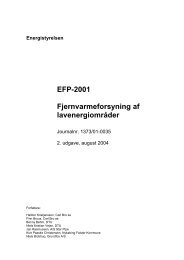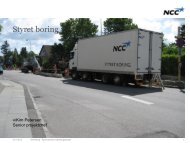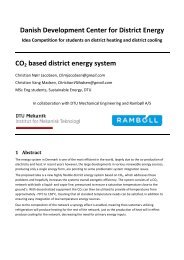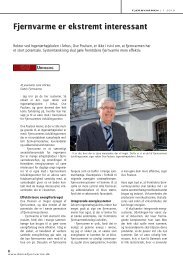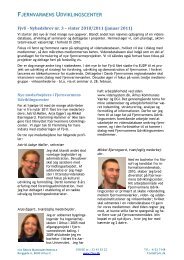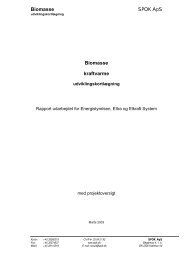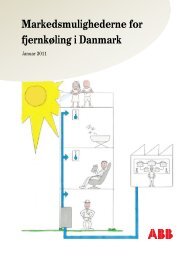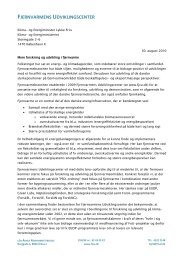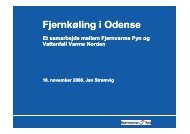The <str<strong>on</strong>g>12th</str<strong>on</strong>g> <str<strong>on</strong>g>Internati<strong>on</strong>al</str<strong>on</strong>g> <str<strong>on</strong>g>Symposium</str<strong>on</strong>g> <strong>on</strong> <strong>District</strong> <strong>Heating</strong> <strong>and</strong> <strong>Cooling</strong>,September 5 th to September 7 th , 2010, Tallinn, Est<strong>on</strong>iaestablish <strong>and</strong> maintain relati<strong>on</strong>s, as well as ifdisc<strong>on</strong>necti<strong>on</strong>s have occurred or may occur. Builtenvir<strong>on</strong>ment relates to how comm<strong>on</strong> multi-familybuildings are <strong>and</strong> if these have a central heatingsystem for the whole house. Table I ends with districtheatingproducti<strong>on</strong> <strong>and</strong> distributi<strong>on</strong> issues. Biomassc<strong>on</strong>siders domestic biomass supplies <strong>and</strong>infrastructure for biomass fuel supply. Waste includescurrent waste management <strong>and</strong> attitudes towardwaste incinerati<strong>on</strong>. CHP c<strong>on</strong>cerns regulati<strong>on</strong>shampering CHP producti<strong>on</strong> as well as problems inexisting plants. Finally, district heating distributi<strong>on</strong> inTable I encompasses difficulties with building networks<strong>and</strong> deficiencies in existing distributi<strong>on</strong>.The assessments in Table I were primarily made withineach country <strong>and</strong> sec<strong>on</strong>dly countries were compared butmostly the ranking of countries for a parameter isappropriate. However, every grade has a certain ‖width‖<strong>and</strong> two countries with the same digit may differ. As anexample, district heating is assessed to be somewhatless competitive in Romania than in the Czech Republic.It follows a descripti<strong>on</strong> of barriers in the individualcountries emphasising the largest barriers.Table I. – Height of DH barriers in analysed countries [1]BARRIER UK IRELAND FRANCE CZECH REPUBLIC ROMANIAOwnership <strong>and</strong> organisati<strong>on</strong> 1 0 4 2 3Corrupti<strong>on</strong> 0 0 0 2 3Nati<strong>on</strong>al <strong>and</strong> local c<strong>on</strong>trol 3 2 1 2Financing 4 3 2 3 3Fragmented value chain 4 3 1 2 1Entrance barrier for foreign companies 1 1 4 2 2DH competitiveness 2 1 3 4 4Customer relati<strong>on</strong>s 2 2 1 4Built envir<strong>on</strong>ment 3 4 2 0 0Biomass 3 3 1 3 1Waste 1 1 3 4 2CHP 3 3 2 4 4DH distributi<strong>on</strong> 4 4 1 4THE BRITISH ISLESIn the United Kingdom (UK), <strong>and</strong> even more in Irel<strong>and</strong>,district heating is not really an establishedphenomen<strong>on</strong>. Figure 2 shows that residences mostlyare heated with gas in the UK, often through a gasboiler for the individual household. Oil is the mostcomm<strong>on</strong> fuel in Irish homes but gas is exp<strong>and</strong>ing.The largest problem is district heating distributi<strong>on</strong>(Table I). It is expensive <strong>and</strong> complicated to build DHnetworks in already built areas <strong>and</strong>, at least in the UK,it is not straightforward to obtain a licence for puttingdistrict heating pipes into streets. The financingdifficulties in the British Isles are primarily due to afragmented value chain with many c<strong>on</strong>tract issues thatneed to be solved before a larger district heatingscheme can be deployed. British thinking is based <strong>on</strong>competiti<strong>on</strong> <strong>and</strong> individual choices. A collective largescale soluti<strong>on</strong>, such as district heating, may c<strong>on</strong>flictwith principles <strong>and</strong> traditi<strong>on</strong>. Another large barrier is thebuilt envir<strong>on</strong>ment. Few people live in multi-familyhouses in the UK <strong>and</strong> even fewer in Irel<strong>and</strong> [3], <strong>and</strong>even these buildings often lack central heating, butindividual heating of apartments is comm<strong>on</strong>. Biomass225is rated as a rather large barrier in Table I becausesupplies are limited in the British Isles <strong>and</strong> fuel supplysystems are less developed.UK Government <strong>and</strong> municipalities have hitherto notfacilitated district-heating development sufficiently <strong>and</strong>str<strong>on</strong>g incentives for deploying district heating systemsare lacking. <strong>Heating</strong> is generally not regarded as apublic c<strong>on</strong>cern, but as a c<strong>on</strong>cern for each individual.Nati<strong>on</strong>al <strong>and</strong> local c<strong>on</strong>trol is therefore indicated as arather large barrier in Table I. In Irel<strong>and</strong>, the situati<strong>on</strong>seems to be slightly better but in both countries certainregulati<strong>on</strong>s, designed with electricity <strong>and</strong> gas in mind,are disadvantageous for district heating. CHP suffersespecially from rules <strong>on</strong> how produced heat <strong>and</strong> powermay be supplied.Customer relati<strong>on</strong>s are complicated because districtheating is a rather unknown energy form <strong>and</strong> there is acertain resistance against collective soluti<strong>on</strong>s [3]. Thereis a lack of st<strong>and</strong>ardised terms of c<strong>on</strong>tract forc<strong>on</strong>necti<strong>on</strong> to <strong>and</strong> delivery of district heating. Potentialheat suppliers <strong>and</strong> customers feel insecure c<strong>on</strong>cerninghow many users that will c<strong>on</strong>nect to a DH grid, for howl<strong>on</strong>g they will stay <strong>and</strong> if heat supply may be
The <str<strong>on</strong>g>12th</str<strong>on</strong>g> <str<strong>on</strong>g>Internati<strong>on</strong>al</str<strong>on</strong>g> <str<strong>on</strong>g>Symposium</str<strong>on</strong>g> <strong>on</strong> <strong>District</strong> <strong>Heating</strong> <strong>and</strong> <strong>Cooling</strong>,September 5 th to September 7 th , 2010, Tallinn, Est<strong>on</strong>iainterrupted. The competitiveness of district heatingcompared to gas c<strong>on</strong>cerning availability <strong>and</strong> price isc<strong>on</strong>sidered as a medium severe barrier in the BritishIsles (Table I).Legend: Grade 4: Large barrier, Grade 3: , Grade 2: , Grade 1: Small barrier, Grade 0: Assessed not to be a barrier,No grade: No assessment.100%90%80%70%60%50%40%30%20%10%0%UK Irel<strong>and</strong> France France Czech Czech Republic Republic Romania Romania<strong>District</strong> <strong>District</strong> heating heating Gas Gas Biomass Biomass Peat Peat Electricity Electricity Oil Oil Coal CoalFig. 2. <strong>Heating</strong> of residences [1], [4]–[6]FRANCETable I shows that <strong>on</strong>e of the largest barriers in Francec<strong>on</strong>cerns the organisati<strong>on</strong> of district-heating operati<strong>on</strong>s.Most DH systems are managed by private Frenchcompanies according to l<strong>on</strong>g-term c<strong>on</strong>cessi<strong>on</strong>s [7]. Thecompanies have successfully applied this DHmanagement model in several other countries. By sucharrangements, it is important that operators haveincentives to make investments even if these havepayback times l<strong>on</strong>ger than the c<strong>on</strong>cessi<strong>on</strong> period [8]. Itis unclear if the French DH management model isdisadvantageous for district heating development but itshould anyway be a large barrier for foreign companieswanting to enter the French market. In general,domestic soluti<strong>on</strong>s are preferred. There is no str<strong>on</strong>gactor who provides unbiased support for districtheating. The dominating DH operators also sellelectricity <strong>and</strong> gas, which both cover a large fracti<strong>on</strong> ofthe heat dem<strong>and</strong> (Fig. 2) <strong>and</strong> offer district heatingsevere competiti<strong>on</strong>. Only ten percent of the apartments<strong>and</strong> four percent of all residences have district heatingtoday, <strong>and</strong> DH expansi<strong>on</strong> is slow [6].Fig. 3 shows that <strong>on</strong>e-half of the district heating inFrance is produced with natural gas, mostly in CHPplants. The main part of the renewable energy used fordistrict heating producti<strong>on</strong> is waste, which is used to aslowly growing extent [7]. But French wasteincinerati<strong>on</strong> plants are mostly built far away from towns,which makes it difficult to utilise the heat [6].CoalRenewablesMiscellaneousOilNaturalgas CHPNaturalgas heatFig. 3. <strong>District</strong> heating producti<strong>on</strong> in France [9]Financing is c<strong>on</strong>sidered to be a smaller problem inFrance. The market dominati<strong>on</strong> by a few actors maypresent an indirect financial barrier. Quite a few peoplelive in apartments but most multi-family houses lackcentral heating. The large French nuclear powerproducti<strong>on</strong> is <strong>on</strong>e reas<strong>on</strong> for worse CHP c<strong>on</strong>diti<strong>on</strong>s,which is assessed as a medium-grade barrier (Table I).THE CZECH REPUBLICFig. 2 shows that district heating covers a substantialpart of residential heating in the Czech Republic, butelectricity is used to the same extent <strong>and</strong> gas is themost comm<strong>on</strong> heat source. <strong>District</strong> heating covers <strong>on</strong>ehalfof the apartments <strong>and</strong> 60% of urban heating [7].A large barrier in the Czech Republic is, according toTable I, the competitiveness of district heating.226
- Page 1:
12th Inter
- Page 5 and 6:
The 12th I
- Page 7 and 8:
The 12th I
- Page 10 and 11:
The 12th I
- Page 12 and 13:
The 12th I
- Page 14 and 15:
For the case of parallel buried pip
- Page 16 and 17:
The 12th I
- Page 18 and 19:
The 12th I
- Page 20 and 21:
The 12th I
- Page 22 and 23:
The 12th I
- Page 24 and 25:
The 12th I
- Page 26 and 27:
The 12th I
- Page 28 and 29:
The 12th I
- Page 30 and 31:
The 12th I
- Page 32 and 33:
The 12th I
- Page 34 and 35:
The 12th I
- Page 36 and 37:
The 12th I
- Page 38 and 39:
The 12th I
- Page 40 and 41:
The 12th I
- Page 42 and 43:
The 12th I
- Page 44 and 45:
The 12th I
- Page 46 and 47:
The 12th I
- Page 48 and 49:
The 12th I
- Page 50 and 51:
The 12th I
- Page 52 and 53:
The 12th I
- Page 54 and 55:
The 12th I
- Page 56 and 57:
The 12th I
- Page 58 and 59:
The 12th I
- Page 60 and 61:
The 12th I
- Page 62 and 63:
The 12th I
- Page 64 and 65:
The 12th I
- Page 66 and 67:
The 12th I
- Page 68 and 69:
The 12th I
- Page 70 and 71:
The 12th I
- Page 72 and 73:
The 12th I
- Page 74 and 75:
The 12th I
- Page 76 and 77:
The 12th I
- Page 78 and 79:
The 12th I
- Page 80 and 81:
The 12th I
- Page 82 and 83:
The 12th I
- Page 84 and 85:
The 12th I
- Page 86 and 87:
The 12th I
- Page 88 and 89:
The 12th I
- Page 90 and 91:
The 12th I
- Page 92 and 93:
The 12th I
- Page 94 and 95:
The 12th I
- Page 96 and 97:
The 12th I
- Page 98 and 99:
the street the more shallow the sha
- Page 100 and 101:
The 12th I
- Page 102 and 103:
The 12th I
- Page 104 and 105:
The 12th I
- Page 106 and 107:
The 12th I
- Page 108 and 109:
The 12th I
- Page 110 and 111:
P-1P-4P-9P-7E-5P-14P-8The 1
- Page 112 and 113:
The 12th I
- Page 114 and 115:
The 12th I
- Page 116 and 117:
The 12th I
- Page 118 and 119:
The 12th I
- Page 120 and 121:
The 12th I
- Page 122 and 123:
The 12th I
- Page 124 and 125:
The 12th I
- Page 126 and 127:
The 12th I
- Page 128 and 129:
The 12th I
- Page 130 and 131:
The 12th I
- Page 132 and 133:
The 12th I
- Page 134 and 135:
The 12th I
- Page 136 and 137:
The 12th I
- Page 138 and 139:
to heating costs of 14,5 ct/kWh. Th
- Page 140 and 141:
The 12th I
- Page 142 and 143:
The 12th I
- Page 144 and 145:
The 12th I
- Page 146 and 147:
The 12th I
- Page 148 and 149:
academic access is facilitated as t
- Page 150 and 151:
The 12th I
- Page 152 and 153:
The 12th I
- Page 154 and 155:
The 12th I
- Page 156 and 157:
The 12th I
- Page 158 and 159:
The 12th I
- Page 160 and 161:
The 12th I
- Page 162 and 163:
1. CHP system operation in A2. Ther
- Page 164 and 165:
The 12th I
- Page 166 and 167:
is covered by operating HOB. In oth
- Page 168 and 169:
The 12th I
- Page 170 and 171:
The 12th I
- Page 172 and 173:
The 12th I
- Page 174 and 175:
The 12th I
- Page 176 and 177: The 12th I
- Page 178 and 179: The 12th I
- Page 180 and 181: The 12th I
- Page 182 and 183: The 12th I
- Page 184 and 185: The 12th I
- Page 186 and 187: The 12th I
- Page 188 and 189: The 12th I
- Page 190 and 191: The 12th I
- Page 192 and 193: The 12th I
- Page 194 and 195: The 12th I
- Page 196 and 197: produce heat and electricity. Fluct
- Page 198 and 199: The 12th I
- Page 200 and 201: The 12th I
- Page 202 and 203: The 12th I
- Page 204 and 205: The 12th I
- Page 206 and 207: The 12th I
- Page 208 and 209: The 12th I
- Page 210 and 211: To assure that the temperatures mea
- Page 212 and 213: The 12th I
- Page 214 and 215: The 12th I
- Page 216 and 217: The 12th I
- Page 218 and 219: The 12th I
- Page 220 and 221: production and provide for marginal
- Page 222 and 223: The 12th I
- Page 224 and 225: The 12th I
- Page 228 and 229: The 12th I
- Page 230 and 231: The 12th I
- Page 232 and 233: The 12th I
- Page 234 and 235: The 12th I
- Page 236 and 237: The 12th I
- Page 238 and 239: The 12th I
- Page 240 and 241: The 12th I
- Page 242 and 243: In addition, it can also be observe
- Page 244 and 245: The 12th I
- Page 246 and 247: owner is normally only interested i
- Page 248 and 249: The 12th I
- Page 250 and 251: The 12th I
- Page 252 and 253: The 12th I
- Page 254 and 255: The 12th I
- Page 256 and 257: The 12th I
- Page 258 and 259: The 12th I
- Page 260 and 261: The 12th I
- Page 262 and 263: The 12th I
- Page 264 and 265: The 12th I
- Page 266 and 267: The 12th I
- Page 268 and 269: The 12th I
- Page 270 and 271: The 12th I
- Page 272 and 273: The 12th I
- Page 274 and 275: The 12th I
- Page 276 and 277:
The 12th I
- Page 278 and 279:
The 12th I
- Page 280 and 281:
The 12th I
- Page 282 and 283:
The 12th I
- Page 284 and 285:
The 12th I
- Page 286 and 287:
The 12th I
- Page 288 and 289:
The 12th I
- Page 290 and 291:
Stockholm district heating system a
- Page 292 and 293:
The 12th I
- Page 294 and 295:
The 12th I
- Page 296 and 297:
The 12th I
- Page 298 and 299:
The 12th I
- Page 300 and 301:
The 12th I
- Page 302 and 303:
The 12th I
- Page 304 and 305:
The 12th I
- Page 306 and 307:
The 12th I
- Page 308 and 309:
The 12th I
- Page 310 and 311:
The 12th I
- Page 312 and 313:
The 12th I
- Page 314 and 315:
The values presented do of course l
- Page 316 and 317:
The 12th I
- Page 318 and 319:
The 12th I
- Page 320 and 321:
The 12th I
- Page 322 and 323:
The 12th I
- Page 324 and 325:
The 12th I
- Page 326:
The 12th I




